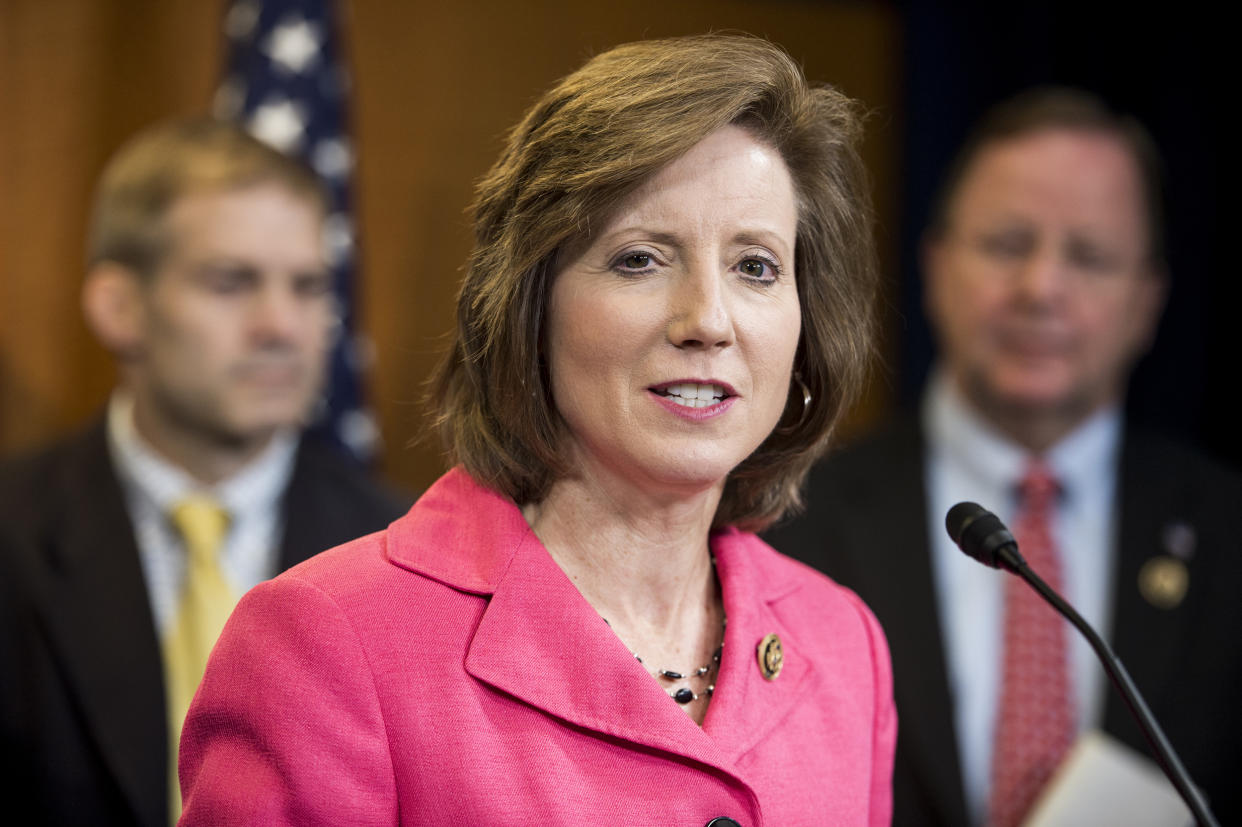Gay man blasts his GOP lawmaker aunt who cried during gay marriage 'no' vote
A GOP congresswoman went viral Thursday for tearfully begging her colleagues to vote against a bill that would protect same-sex marriage nationwide. Now, her gay nephew is going viral as well.
In a video he posted on TikTok — which had been viewed over 556,000 times as of Friday afternoon — Andrew Hartzler slammed his aunt, Rep. Vicky Hartzler, R-Mo., for her tearful rebuke of the Respect for Marriage Act.
“Today, my aunt Vicky started crying because gay people like me can get married,” Andrew, 24, said in the video, which was shared Thursday. “So despite coming out to my aunt this past February, I guess she’s still as much of a homophobe.”
A representative for the congresswoman could not be reached for comment.
On Thursday, the Republican congresswoman, who lost her primary earlier this year, broke down on the House floor, pleading with her colleagues to reject the bipartisan legislation for the sake of religious freedom.
“I’ll tell you my priorities: Protect religious liberty, protect people of faith and protect Americans who believe in a true meaning of marriage,” Hartzler said through tears. “I hope and pray that my colleagues find the courage to join me in opposing this misguided and this dangerous bill.”
Within hours, her speech exploded online, getting shared by several legacy media outlets and being viewed hundreds of thousands — if not millions — of times on social media.
After watching her viral speech, her nephew told NBC News in an interview that he felt compelled to speak out against her so that his last name is not “associated with hate.”
“The Hartzler name should be for love,” he said.
Andrew, who works in social services and lives in Tulsa, Okla., grew up down the block from his aunt in Kansas City, Mo. He said he recalls childhood memories of picnics, bike rides and trips to Washington, D.C., with her. He added that he would wake up early in the mornings on their family trips so his aunt could take him through the underground tunnel system beneath the Capitol Building.
But when he came out to her as gay in February, she dismissed him, as did other family members in the years prior, he said.
“I was met with the same type of, ‘I love you, but I don’t accept you, because you’re gay,'” he said. “I’m in the mindset where if you’re not for me, you’re against me, and if you don’t 100% accept me, you reject me.”
Since then, the two have not spoken, Andrew said. He added, however, that his aunt invited him to her family’s Thanksgiving dinner but that he did not feel comfortable attending.
Andrew, who said he has struggled with his sexuality throughout his childhood and has undergone so-called gay conversion therapy, said he fears his aunt’s tearful speech on the House floor could be harmful to the mental health of other LGBTQ Americans.
He cited the disproportionate rates of mental health issues plaguing the nation’s LGBTQ youths in particular: Nearly half of lesbian, gay, bisexual, transgender and queer youths in the U.S. have “seriously considered” suicide in the past year, a survey by LGBTQ youth suicide prevention group The Trevor Project reported earlier this year.
“The type of narrative that my aunt is giving, that has real-world effects,” Andrew said. “I’d be doing them a disservice if I didn’t counteract her narrative with truth.”
This is not the first time Andrew has advocated on behalf of the LGBTQ community. He joined a class-action lawsuit filed last year against the Department of Education that is seeking to end an exemption in federal civil rights law that, according to the suit, allows religiously affiliated universities that receive federal funding to “openly discriminate” against LGBTQ students.
In her speech against the Respect for Marriage Act, Rep. Hartzler argued that the legislation “disrespects the importance of traditional marriage for the health of a family” and that its “only purpose is to hand the federal government a legal bludgeoning tool to drive people of faith out of the public square and silence anyone who dissents.”
The legislation contains an amendment clarifying that religious organizations wouldn’t be required to perform same-sex marriages and that the government would not be forced to protect polygamous marriages. In her speech, the congresswoman called the amendment “hollow.”
“It’s really interesting to me how my aunt and other members of the religious right only use the term religious freedom or religious liberties when they’re talking about taking away other people’s rights,” Andrew said. “That is their excuse to show blatant discrimination.”
In addition to ensuring that the federal government recognizes same-sex marriages that were validly performed, the legislation will also protect interracial marriages. It would not compel states to issue marriage licenses that contradict state law.
The legislation went on to pass the House by a vote of 258-169, with 39 Republicans supporting the legislation. Last week, it passed the Senate with bipartisan support — including the votes of 12 Republicans — and is expected to be signed into law by President Joe Biden.
Source: Read Full Article
